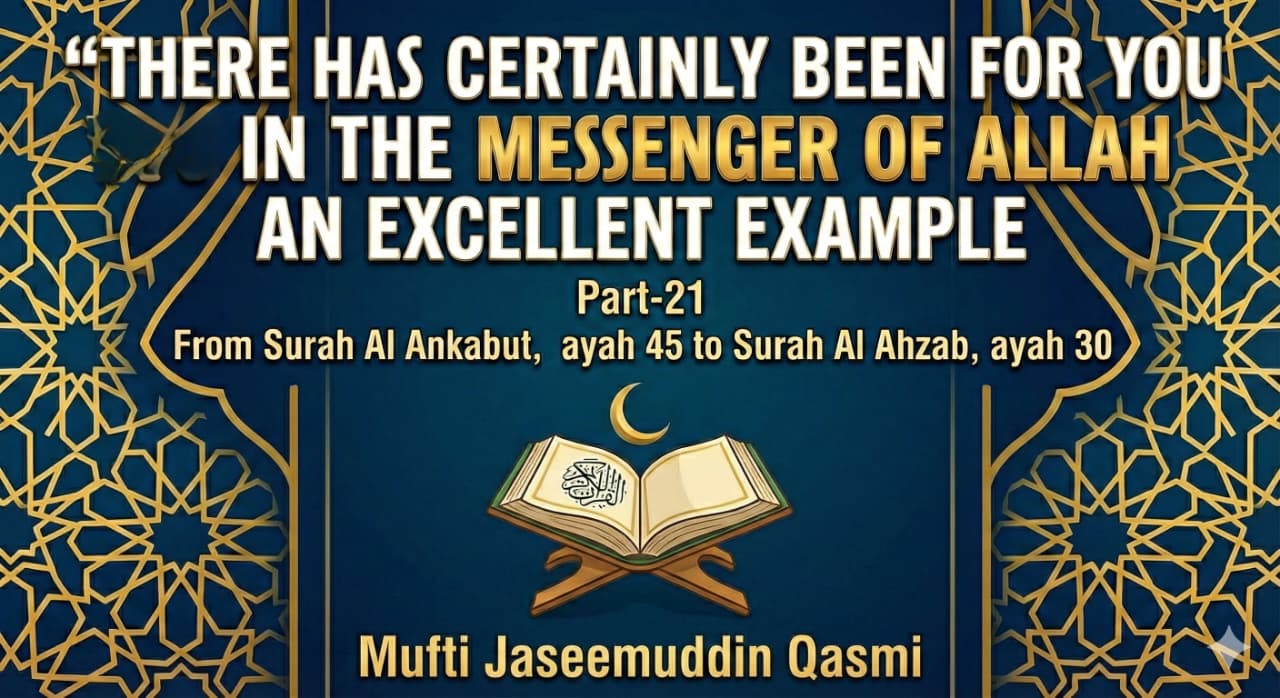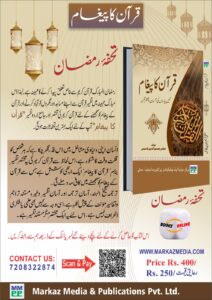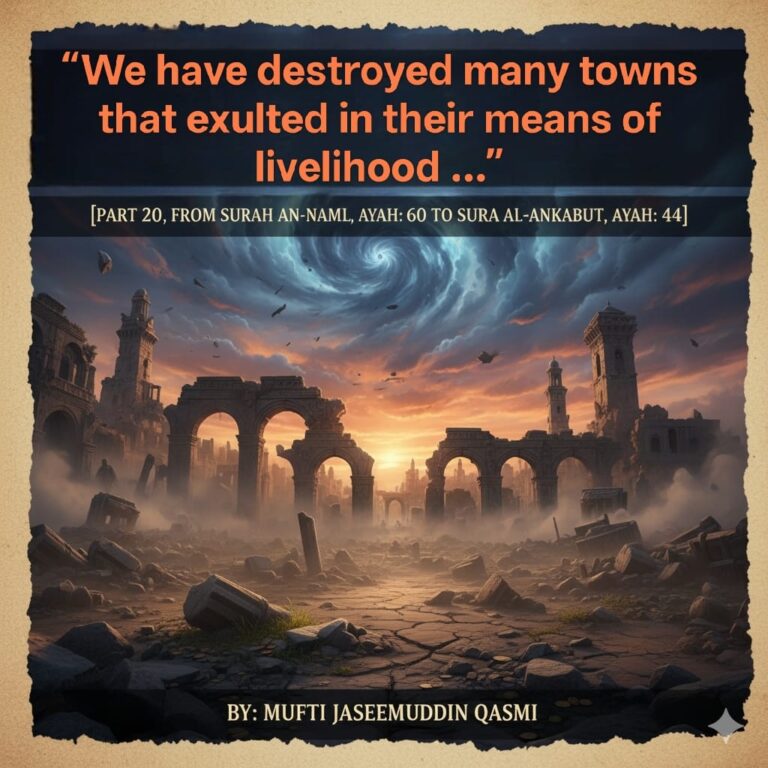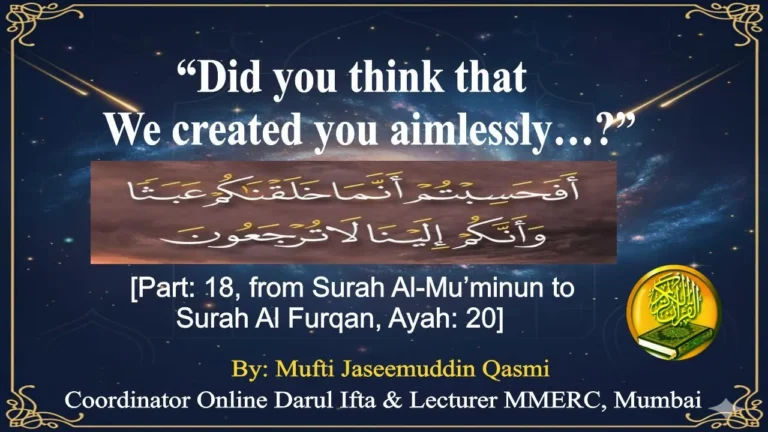
There Has Certainly Been For You in the Messenger of Allah an Excellent Example
There Has Certainly Been For You in the Messenger of Allah an Excellent Example
[Part-21, from Surah Al Ankabut, ayah 45 to Surah Al Ahzab, ayah 30]
By: Mufti Jaseemuddin Qasmi
Coordinator Online Darul Ifta& Lecturer
MMERC, Mumbai
In the first ayah of Part-21 of the Qur’an, Allah says, “(O Muhammad) Recite what has been revealed to you of the Book and establish prayer. Indeed, prayer prohibits immorality and wrongdoing, and the remembrance of Allah is greater. And Allah knows that which you do.”
That means, if a person performs the prayer as it should be performed and focuses on its true purpose, it will prevent them from indecency and every evil deed.
In ayah 56, Allah says, “O My servants who believe, My earth is vast, so, worship Me!”
When the disbelievers of Makkah had reached the peak of their oppression and persecution against the Muslims, they were initially instructed to remain patient and steadfast. But in this ayah, permission was granted that the earth of Allah is vast — therefore, migrate to another place where you can worship Allah peacefully and securely.
There might have been a fear in migration — that they had an established means of livelihood in Makkah, and if they moved elsewhere, they might not find a suitable source of income. The answer to this concern is given in ayah 60, where Allah says: “And how many creatures there are that do not carry their provision with them! Allah provides the sustenance to them to them and to you as well…”
Allah says in ayah 69, “As for those who strive in Our cause, We will surely guide them to Our paths; and indeed, Allah is with those who do good.”
In this ayah a great glad tidings is given to those who strive to follow the religion of Allah themselves and to guide others upon it.
Surah Ar-Rum
﷽
The Glory of Caesar and Chosroes
Here begins Surah Ar-Rum. This Surah is Makki, and it consists of 60 ayahs. The Surah has a significant historical background, which serves as undeniable proof of the truth of the Qur’an.
At the time when the Prophet Muhammad (saws) was granted prophethood, there were two superpowers in the world: one was the Persian Empire, which extended across the eastern regions, and every Persian ruler was known as Kisra (Chosroes). The Persians were fire-worshippers. The other superpower was the Roman Empire, which extended north and west of Makkah, including regions such as Syria, Egypt, Asia Minor the Asian portion of modern-day Turkey and parts of Europe. Every Roman ruler was known as Qaisar (Caesar), and most of them followed the Christian faith.

When this Surah was revealed, these two empires were engaged in a fierce war. At that time, the Persians were dominant in every respect. Their armies had repeatedly defeated the Roman forces and captured many of their major cities. They even went so far as to destroy the Christians’ most sacred church in Jerusalem and continued to drive the Romans back. The Roman emperor, Heraclius, found it increasingly difficult to find a safe refuge.
Since the Persians were fire-worshippers, the idolaters of Makkah felt sympathy for them. Whenever news came of a Persian victory, the idolaters of Makkah would rejoice and mock the Muslims, saying: “Look! The Christians—who, like you, believe in a divine book—are being defeated, while the Persians, who, like us, reject prophets and divine revelation, are victorious!”
It was at this very time when Surah Ar-Rum was revealed.
The Victory of the Romans and the Win of Abu Bakr (ra)
At the very beginning of this Surah, a prophecy was made that although the Romans had been defeated at that time, within a few years they would achieve victory and overcome the Persians. On that day, the believers would rejoice at the help of Allah.
At that moment, both of these predictions seemed impossible. The idolaters of Makkah mocked this prophecy relentlessly. One of their prominent chiefs, Ubai ibn Khalaf, even made a wager with Hazrat Abu Bakr al-Siddiq (ra). He said that if within the next nine years, the Romans were to defeat the Persians, he would give Abu Bakr one hundred camels; but if the Persians remained victorious, Abu Bakr (ra) would owe him one hundred camels.
At that time, such betting had not yet been prohibited in Islam.
After this ayah was revealed, the Persians continued to gain victories. Their armies advanced until they reached the very walls of Constantinople, the Roman capital, forcing Emperor Heraclius to flee toward Tunisia. However, Heraclius regrouped and launched a counterattack from the rear against the Persians. This sudden move brought him a remarkable victory that completely turned the tide of the war.
Only seven years had passed since the Qur’anic prophecy when news of the Roman victory reached Arabia. It so happened that at the same time, in the Battle of Badr, the Prophet Muhammad (saws) and his Companions inflicted a crushing defeat on the army of the Quraish of Makkah.
The Muslims rejoiced greatly—both for their own victory and for the fulfillment of Allah’s promise regarding the Romans. Thus, both the Qur’anic prophecies were fulfilled before everyone’s eyes in a manner that had seemed utterly impossible at the time.
At that time, Ubai ibn Khalaf, who had made the bet with Abu Bakr (ra), had already died. However, his sons fulfilled their father’s pledge and handed over one hundred camels to Hazrat Abu Bakr (RA) as per the terms of the bet.
By then, the prohibition of gambling had been revealed, and since such mutual bets were a form of prohibited gambling, the Prophet (saws)instructed Abu Bakr al-Siddiq (ra) not to make any personal use of those camels but instead to give them away in charity.
The ruling issued by Indian scholars regarding bank interest—that any interest money withdrawn from the bank should be given to the poor and not used for personal benefit—is based on this very example from the life of Abu Bakr Siddiq(ra).
From ayahs 2 to 6 of Surah Ar-Rum, Allah mentions the victory of the Romans and the joy of the believers at both the Roman triumph and the divine help granted to the Muslims.
In ayah 21, the woman is described as a source of love and tranquility, as Allah says:
“And among His signs is that He created for you from yourselves mates that you may find tranquility in them; and He placed between you affection and mercy. Truly there are signs in this for people who think.”
In ayah 22, the existence of the heavens and the earth, as well as the diversity of human languages and colors, has been declared as among the signs of Allah’s power.
No Change Can Be Made in the Creation of Allah
In ayah 30, Allah says: “So set your face toward the religion, devoted solely to it. (Adhere to)The nature made by Allah upon which He has created all people. No change should there be made in the creation of Allah. That is the correct religion, but most of the people do not know.”
This ayah declares that there is no scope for altering Allah’s creation. Therefore, any modification to the human physiology that destroys or changes its natural functions is not permissible. For this reason, sterilization or unnecessary plastic surgery is not allowed in Islam.
In ayah 38, Allah commands: “Give to your relatives, the needy, and the traveler their due right.” This ayah teaches us that when we help them through zakat or charity, it is not a favor, but rather the fulfillment of their rightful share that Allah has established in our wealth. That’s why, in the third Part of the Qur’an, Allah warns that boasting about one’s charity nullifies its reward.
In ayah 41, Allah states that chaos and disorder on land and sea appear as a consequence of people’s evil deeds.
Surah Luqman
﷽
Hakim Luqman and His Words of wisdom
Here begins Surah Luqman. It is a Makki Surah and consists of 34 ayahs. Luqman was renowned among the Arabs as a man of great wisdom and intelligence. The prevailing view is that he was not a prophet. His wise sayings were highly valued by the Arabs — so much so that poets even mentioned him in their ayahs as a symbol of wisdom. The Qur’an, in this Surah, makes it clear that even Luqman — the wise and intelligent man whose wisdom you acknowledge — was a believer in Tawheed (the Oneness of Allah).
In ayahs 12, 13, 14, 17, 18 and 19, Hakim Luqman and his advices are mentioned. The ayahs state:
“And We had certainly given Luqman wisdom, [saying], “Be grateful to Allah.” And whoever is grateful is grateful for himself. And whoever denies (His favor) – then indeed, Allah is Free of need and Praiseworthy.”
“And [mention, O Muhammad], when Luqman said to his son while he was instructing him, ‘O my son, do not associate (anything) with Allah. Indeed, association (with him) is great injustice.’”
[And Luqman said], “O my son, indeed if wrong should be the weight of a mustard seed and should be within a rock or (anywhere) in the heavens or in the earth, Allah will bring it forth. Indeed, Allah is Subtle and Aware.”

“O my son, establish prayer, enjoin what is right, forbid what is wrong, and be patient over what befalls you. And do not turn your cheek (in pride)away from people and do not walk on the land exultantly. Indeed, Allah does not like everyone self-deluded and boastful. And be moderate in your pace and lower your voice; indeed, the most disagreeable of sounds is the voice of donkeys.”
The message of ayah 15 and 16 is that Allah commands mankind to show kindness, respect, and gratitude to their parents, especially emphasizing the mother’s hardships during pregnancy and nursing for two years. Gratitude should be shown both to Allah and to one’s parents, as all blessings come from them. However, if parents urge their children to commit shirk (associate partners with Allah), they must not be obeyed in that matter. Still, one must continue to treat them kindly and respectfully in worldly affairs.
Surah As-Sajdah
﷽
Here begins Surah As-Sajdah. It is a Makki Surah consisting of 30 ayahs. The Prophet (saws) frequently recited this Surah in the first rak‘ah of the Fajr prayer on Fridays. He would also recite two Surahs every night before sleeping — Surah As-Sajdah and Surah Al-Mulk.
The main theme of this Surah revolves around the fundamental beliefs of Islam — Tawheed (the Oneness of Allah), the Prophethood of the Messenger (saws), and the affirmation of the Hereafter.
In ayah 17, Allah says: “So no soul knows the comfort of the eyes that is kept hidden for them; as a reward for what they used to do.”
And in ayah 18, it is stated: “So will the believer ever be equal to the one who is sinner? They are not equal!.”
Surah Al-Ahzab
﷽
Here begins Surah Al-Ahzab. It is a Madani Surah and consists of 73 ayahs. The background of the revelation of this Surah consists of four major incidents, all of which are mentioned in it.
The first incident is the Battle of Ahzab (the Battle of the Confederates / Trench). After the setbacks faced by the Quraish in the Battles of Badr and Uhud, they incited other Arab tribes against the Prophet (saws) and formed a united front to attack Madinah. Upon the advice of Hazrat Salman Farsi (ra), the Prophet (saws) had a defensive trench dug near Madinah so that the enemy would not be able to cross it and reach the city. The key events of this battle are described in this Surah.
The Battle of Banu Quraizah
The second important incident is the Battle of Banu Quraizah. Banu Quraizah was a Jewish tribe that lived on the outskirts of Madinah. After the Hijrah, the Prophet (saws) had made a peace treaty with them. However, in addition to other violations of the agreement, the Jews of Banu Quraizah, at the extremely critical moment of the Battle of Ahzaab, secretly conspired and attempted to stab the Muslims in the back. Therefore, after the Battle of Ahzaab concluded, Allah commanded that an immediate attack be launched on Quraizah to eliminate these “snakes in the grass” who had betrayed the trust.
An adopted son is not a real son
The third important incident was that when the Arabs adopted someone as a son, they would give him the same status as a biological son in all matters. These deeply ingrained wrong customs of the Arabs had become so deeply rooted in their hearts that merely verbal advice could not bring an end to them. Therefore, to put a stop to this practice, Allah commanded the Prophet (saws) to marry the divorced wife of his adopted son, Zaid ibn Hārithah (ra). It was during the walimah (marriage feast) of this marriage that the ayahs containing the injunctions of hijab were revealed, which are part of this Surah.
The request of the Mothers of the Believers for an increase in their maintenance
The fourth incident is that although the noble wives of the Prophet (saws) stood by him faithfully through every difficulty and hardship, when financial ease came after various victories, they requested an increase in their personal maintenance. Under normal circumstances, such a request would not have been inappropriate in any way. However, the lofty status of these blessed women—honored with being the wives of the greatest Prophet (saws)—was far above such worldly demands.
Therefore, in this Surah, Allah granted them a choice: if they desired the adornments and comforts of worldly life, the Prophet (saws) was prepared to part with them honorably and respectfully. But if they chose to remain companions in the mission of the Prophet (saws) and sought the rewards of the Hereafter, then such requests would not be befitting for them.
Allah says in ayah 4, “Allah has not made for a man two hearts in his inside. And He has not made your wives whom you declare unlawful your mothers. And he has not made your adopted sons your sons. That is merely your saying by your mouths, but Allah says the truth, and He guides to the right way.”
The disbelievers and hypocrites were suggesting prophet (saws) that he should try to please Allah and, at the same time, accept their demands so that he may please them as well. However, Allah has created only one heart in a person’s chest — it can either follow the will of Allah or follow the will of others besides Him.
This ayah also mentions Zihār, the details of which will be explained in Surah al-Mujādilah.
Ayah 9 says, “O you who have believed, remember the favor of Allah upon you when armies came against you and We sent upon them a wind and armies (of angels) you did not see. And Allah sees what you do.”
The Battle of the Trench / Ahzab is mentioned in this ayah, where Allah helped the Muslims through angels and a fierce windstorm that uprooted the enemy’s tents, overturned their cooking pots, destroyed their stoves, and caused their riding animals to panic and flee. As a result, the enemy was forced to retreat. Up to ayah 27 of Surah Al Ahzab, various aspects of this battle are discussed.
Allah Almighty says in ayah 21, “There has certainly been for you in the Messenger of Allah an excellent example for anyone whose hope is in Allah and the Last Day and who remembers Allah often.”
Ayah 26 speaks about Banu Quraizah, “And He (Allah) brought down those of the people of the Book (Jews) who supported them (enemies of Muslims) from their fortresses and cast terror into their hearts so that you kill a group among them and you make captive another group.”

Ayah 28 and 29 speaks about the noble wives of prophet (saws), “O prophet! Say to your wives: “If you desire the life of this world and its adornment, then come, I will give you a provision and divorce you in a handsome manner”. But if you desire Allah and His Messenger and the home of the Hereafter – then indeed, Allah has prepared for the doers of good among you a great reward.”
According to instructions given by Allah in these ayahs, the Prophet (saws) presented this offer to his noble wives, and all of them chose to remain with the Prophet (saws), even if they had to endure any kind of hardship or difficulty for it.
You May Also Like
 Qur'anic Wisdom
Qur'anic Wisdom“We have destroyed many towns that exulted in their means of livelihood …”
“We have destroyed many towns that exulted in their means of livelihood …” [Part...
 Qur'anic Wisdom
Qur'anic WisdomTHE QUR'AN WITHOUT ARABIC TEXT IS NOT THE QUR'AN
THE QUR'AN WITHOUT ARABIC TEXT IS NOT THE QUR'AN By: M. Burhanuddin Qasmi Editor,...
 Qur'anic Wisdom
Qur'anic Wisdom“Warn Your Closest Relatives.”
“Warn Your Closest Relatives.” [Part: 19, from Surah Al-Furqa, Ayah: 21 to Surah An...
 Qur'anic Wisdom
Qur'anic Wisdom“Did you think that We created you aimlessly…?”
“Did you think that We created you aimlessly…?” [Part: 18, from Surah Al-Mu’minun to...
 Qur'anic Wisdom
Qur'anic Wisdom“Had there been within the heavens and earth gods besides Allah, they both would have been ruined”
“Had there been within the heavens and earth gods besides Allah, they both would...
 Qur'anic Wisdom
Qur'anic Wisdom“Whoever turns away from My remembrance, indeed, he will have a life of great hardship”
“Whoever turns away from My remembrance, indeed, he will have a life of great...

Comments (0)
Leave a Comment